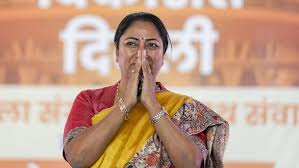NEW DELHI: Union Minister and Bharatiya Janata Party (BJP) National President JP Nadda launched the ‘Mahila Samridhi Yojana,’ a direct cash transfer scheme aimed at benefiting women in Delhi. Speaking at a public event in the national capital on the occasion of International Women’s Day, Nadda announced that the Mahila Samridhi Yojana, which provides Rs 2,500 to women in Delhi, has received approval. Expressing his happiness, Nadda congratulated Chief Minister Rekha Gupta and others involved in the initiative. He further stated that Rs 5,100 crore has been allocated for the implementation of the scheme in Delhi.
During his address, Nadda emphasized the significance of women’s empowerment and expressed his gratitude towards the women of Delhi for their crucial role in forming the BJP government in the state. He credited their support and blessings for the party’s electoral success in Delhi.
Delhi Chief Minister Rekha Gupta also addressed the gathering, asserting that the BJP-led government in the national capital is committed to fulfilling all its promises. She assured that her administration would prioritize the welfare and security of women. Gupta highlighted the widespread appreciation the scheme has received, noting that women from across the country, from North to South and from Gujarat to the Northeast, are extending their congratulatory messages. She reiterated that the Narendra Modi-led government is the only one that has approved 33 percent reservation for women. Gupta assured that her government would implement all promised initiatives, and enhance security measures, and has already taken steps such as constructing pink toilets in Delhi.
Delhi Minister Manjinder Singh Sirsa provided further details about the scheme, confirming that it has been approved and that a dedicated portal will soon be launched, enabling women to apply. He mentioned that specific eligibility criteria and other procedural aspects will be communicated soon. A committee comprising three ministers—Kapil Mishra, Ashish Sood, and Pravesh Verma—has been established to finalize the eligibility conditions and implementation details of the scheme.
Ahead of the Delhi Assembly elections held earlier this year, the BJP had pledged to provide Rs 2,500 to women in Delhi as part of its election promises. This initiative is aimed at promoting financial independence among women from economically weaker sections, helping them sustain their livelihoods and fulfil their essential needs.
The eligibility criteria for the scheme require that applicants be female, aged between 18 and 60 years, and belong to households with an annual income of less than Rs 3 lakh. However, government employees and individuals already receiving financial assistance from the government will not qualify for this scheme.
This initiative aligns with similar financial assistance programs for women in other NDA-ruled states, such as the ‘Ladli Behna Yojana’ in Madhya Pradesh and the ‘Ladki Bahin Yojana’ in Maharashtra. The primary objective of the Mahila Samridhi Yojana is to uplift economically weaker women in the national capital by providing them with financial aid and improving their quality of life.
On the other hand, Senior Congress leader Sandeep Dikshit questioned the financial feasibility of the Mahila Samridhi Yojana, raising concerns about the source of funds for its implementation. He pointed out that the BJP had promised financial assistance to every woman above the age of 18 in Delhi. Referring to Election Commission data, Dikshit stated that there were approximately 72 lakh female voters in the national capital. Given this number, the total expenditure required for the scheme would amount to nearly Rs 21,600 crore annually.
Dikshit highlighted that the overall development budget of Delhi stands at Rs 37,000 crore, which includes allocations for essential sectors such as healthcare, education, and subsidies. He questioned how the government could justify dedicating nearly 60 percent of the total budget to a single scheme while ensuring that other crucial areas of development do not suffer. Speaking to the media, he expressed his concern over whether the large financial commitment to the scheme might lead to compromises in the overall development of the city.








